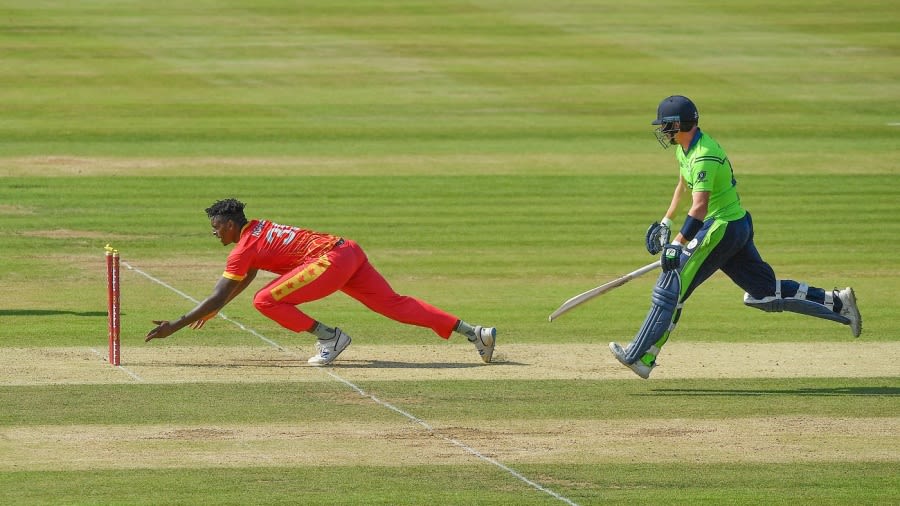DUBLIN – Richard Ngarava defended five off the last over to give Zimbabwe a tense, three-run win in the series opener against Ireland.
Zimbabwe have only defended one total lower than their 117 in Dublin today – 105 against West Indies in February 2010. The win was also Craig Ervine’s first as T20 captain.
After a batting performance riddled with problems, with only Regis Ch akabva scoring more than 20, Zimbabwe’s spinners Wellington Masakadza and Ryan Burl shared five wickets between them, and conceded just 40 runs, to keep Zimbabwe in the contest.
Luke Jongwe took 2 for 17 to reduce Ireland to 88 for 7, leaving the eighth-wicket pair of Simi Singh and Barry McCarthy to finish the job.
Ireland needed 18 runs off the last three overs, 12 off the last two and six off the final over, but Ngarava held his nerve at the end.
His first ball was a yorker that Singh could not dig out, his second was quicker and Singh missed and his third was flicked away for one.
With five needed off the last three, McCarthy walked across his stumps to try and ramp the ball over short fine leg but was bowled.
Craig Young was run-out at the non-striker’s end off the penultimate ball before the last delivery, a low full-toss, cost just one run to give Zimbabwe victory.
Zimbabwe’s openers had a dismal start to the series and were both dismissed in the first 17 balls, playing lazy shots against a fired-up Craig Young.
Wessley Madhevere was unable to build on his form from earlier in the year and the first to go, jabbing at the last ball of the opening opener, to give debutant Neil Rock his first (and what may end up being one of his easiest) catch in international cricket.
After he had a scored a single in the first over, Tadiwanashe Marumani looked like a sitting duck as he negotiated the second over from Barry McCarthy. He inside-edged the first ball, missed the next three and then finally found some defence to face a maiden.
The pressure got to him and Marumani tried to get a move on when he danced down the track in an attempt to heave Young over the leg side, but the quick saw him coming, dragged the length back and had him caught at slip.
Young’s opening spell yielded 2 for 5.
After the opening blunders, Regis Chakabhva helped Zimbabwe recover, sharing the best partnerships of the innings – 38 with Dion Myers and 30 with Craig Ervine.
He gave Zimbabwe their most profitable over against Curtis Campher, who he pulled through midwicket, pounded through point and tucked down to fine leg for three boundaries in his first four balls.
Campher’s first over in this format cost 16 runs all told. Chakabva’s best shot, however, was the six he hit off Singh, when he went down on one knee to send the spinner over midwicket.
By then, Chakabva made sure Zimbabwe had a stable foundation at 79 for 4 in 12 over. But he didn’t read Singh’s wrong ‘un, in the 13th over, and was bowled. He would have been disappointed to fall one short of equalling his score in the format and three shy of a first T20I fifty.
Paul Stirling and Kevin O’Brien are at polar opposite places in terms of form and it showed. Stirling, who is coming off a tournament-winning knock in the Hundred, swept the third ball he faced over square leg for four.
On the other hand, O’Brien, who has scored just two runs in his last three T20I innings, was tentative putting bat on ball.
He was beaten four times by Ngarava’s first six balls and then watched Stirling flat-bat the first ball he faced from Tendai Chatara over point for four and cut the third one for four more.
Stirling had scored 14 off 12 by the time O’Brien got his first run, a single off the ninth delivery he faced.
Stirling then got two more boundaries, to deepen the difference between them.
It was only after Stirling misjudged Jongwe’s length and was bowled that O’Brien found his stride.
He hit Masakadza over extra cover for four for his first boundary in four matches.
He found the rope two more times in his 32-ball innings.
Stirling’s dismissal gave Zimbabwe an opportunity to fight their way back and they were able to, thanks largely to, their legspinner, Burl.
He bowled with good pace and surprised captain Andy Balbirnie with a quick, flat delivery that pinned him on the front pad and then removed George Dockrell and O’Brien with successive balls to leave Ireland on 65 for 4.
Dockrell was caught at long-off trying to clear the rope and O’Brien was bowled when he missed a ball that turned into him.
The hat-trick delivery was to Campher, who managed a single but Burl had given Zimbabwe an opening.
He finished with 3 for 22, by which time fellow spinner Masakadza had two wickets.
Campher holed out to deep midwicket and Shane Getkate was caught reverse-sweeping, at third man.- ESPNCrickInfo


 Slider3 years ago
Slider3 years ago
 National4 years ago
National4 years ago
 Tourism and Environment4 years ago
Tourism and Environment4 years ago
 Opinion4 years ago
Opinion4 years ago
 Special reports4 years ago
Special reports4 years ago
 National4 years ago
National4 years ago
 National3 years ago
National3 years ago
 National3 years ago
National3 years ago


